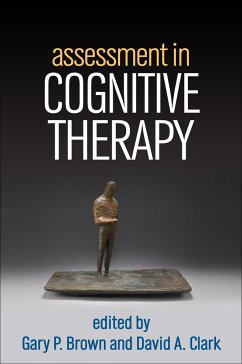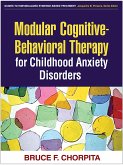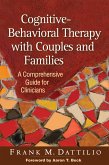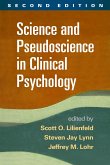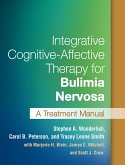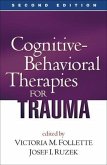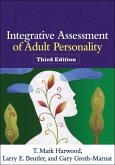Assessment in Cognitive Therapy
Herausgeber: Brown, Gary P; Clark, David A
Assessment in Cognitive Therapy
Herausgeber: Brown, Gary P; Clark, David A
- Broschiertes Buch
- Merkliste
- Auf die Merkliste
- Bewerten Bewerten
- Teilen
- Produkt teilen
- Produkterinnerung
- Produkterinnerung
This volume brings together leading experts to explore the state of the art of cognitive clinical assessment and identify cutting-edge approaches of interest to clinicians and researchers. The book highlights fundamental problems concerning the validity of assessments that are widely used in cognitive-behavioral therapy (CBT). Key directions for further research and development are identified. Updated cognitive assessment methods are described in detail, with particular attention to transdiagnostic treatment, evidence-based practice, cognitive case formulation, and imagery-based techniques.
Andere Kunden interessierten sich auch für
![Modular Cognitive-Behavioral Therapy for Childhood Anxiety Disorders Modular Cognitive-Behavioral Therapy for Childhood Anxiety Disorders]() Bruce F ChorpitaModular Cognitive-Behavioral Therapy for Childhood Anxiety Disorders56,99 €
Bruce F ChorpitaModular Cognitive-Behavioral Therapy for Childhood Anxiety Disorders56,99 €![Cognitive-Behavioral Therapy with Couples and Families Cognitive-Behavioral Therapy with Couples and Families]() Frank M DattilioCognitive-Behavioral Therapy with Couples and Families35,99 €
Frank M DattilioCognitive-Behavioral Therapy with Couples and Families35,99 €![Science and Pseudoscience in Clinical Psychology Science and Pseudoscience in Clinical Psychology]() Science and Pseudoscience in Clinical Psychology70,99 €
Science and Pseudoscience in Clinical Psychology70,99 €![Integrated Group Therapy for Bipolar Disorder and Substance Abuse Integrated Group Therapy for Bipolar Disorder and Substance Abuse]() Roger D WeissIntegrated Group Therapy for Bipolar Disorder and Substance Abuse43,99 €
Roger D WeissIntegrated Group Therapy for Bipolar Disorder and Substance Abuse43,99 €![Integrative Cognitive-Affective Therapy for Bulimia Nervosa Integrative Cognitive-Affective Therapy for Bulimia Nervosa]() Stephen A WonderlichIntegrative Cognitive-Affective Therapy for Bulimia Nervosa43,99 €
Stephen A WonderlichIntegrative Cognitive-Affective Therapy for Bulimia Nervosa43,99 €![Cognitive-Behavioral Therapies for Trauma, Second Edition Cognitive-Behavioral Therapies for Trauma, Second Edition]() Cognitive-Behavioral Therapies for Trauma, Second Edition62,99 €
Cognitive-Behavioral Therapies for Trauma, Second Edition62,99 €![Integrative Assessment of Adult Personality Integrative Assessment of Adult Personality]() T Mark HarwoodIntegrative Assessment of Adult Personality57,99 €
T Mark HarwoodIntegrative Assessment of Adult Personality57,99 €-
-
-
This volume brings together leading experts to explore the state of the art of cognitive clinical assessment and identify cutting-edge approaches of interest to clinicians and researchers. The book highlights fundamental problems concerning the validity of assessments that are widely used in cognitive-behavioral therapy (CBT). Key directions for further research and development are identified. Updated cognitive assessment methods are described in detail, with particular attention to transdiagnostic treatment, evidence-based practice, cognitive case formulation, and imagery-based techniques.
Produktdetails
- Produktdetails
- Verlag: Guilford Publications
- Seitenzahl: 366
- Erscheinungstermin: 31. Oktober 2014
- Englisch
- Abmessung: 260mm x 131mm x 31mm
- Gewicht: 640g
- ISBN-13: 9781462518128
- ISBN-10: 1462518125
- Artikelnr.: 40819391
- Herstellerkennzeichnung
- Libri GmbH
- Europaallee 1
- 36244 Bad Hersfeld
- gpsr@libri.de
- Verlag: Guilford Publications
- Seitenzahl: 366
- Erscheinungstermin: 31. Oktober 2014
- Englisch
- Abmessung: 260mm x 131mm x 31mm
- Gewicht: 640g
- ISBN-13: 9781462518128
- ISBN-10: 1462518125
- Artikelnr.: 40819391
- Herstellerkennzeichnung
- Libri GmbH
- Europaallee 1
- 36244 Bad Hersfeld
- gpsr@libri.de
Gary P. Brown, PhD, is Senior Lecturer in the Psychology Department at Royal Holloway, University of London, United Kingdom, and Director of Research for the Clinical Psychology Doctoral Program. Dr. Brown has published extensively in the area of cognitive therapy for depression and anxiety. His particular focus has been on assessment and measurement, and he has been involved in the development of a number of the key measures used in the field. He has also been active in helping to develop the system of cognitive-behavioral training in the United Kingdom. David A. Clark, PhD, Professor Emeritus in the Department of Psychology at the University of New Brunswick, Canada, has been a practicing clinical psychologist since 1985. He is a Fellow of the Canadian Psychological Association, Founding Fellow and Trainer Consultant of the Academy of Cognitive and Behavioral Therapies, and ad hoc consultant with the Beck Institute for Cognitive Behavior Therapy. Dr. Clark is a recipient of the Aaron T. Beck Award for Significant and Enduring Contributions to Cognitive Therapy. He was a founding member of the Obsessive Compulsive Cognitions Working Group and is a past associate editor of Cognitive Therapy and Research. Dr. Clark has published numerous research and clinical articles and offers professional training workshops worldwide on cognitive-behavioral therapy for OCD, depression, and anxiety disorders. He is the author of numerous books for professionals and the general public.
Introduction
1. Cognitive Clinical Assessment: Contributions and Impediments to
Progress, David A. Clark & Gary P. Brown
I. Cognitive Assessment Strategies and Practices
2. "Better the Devil You Know"? A Conceptual Critique of Endorsement
Methods in Cognitive Research and Practice, Gary P. Brown & David A. Clark
3. Production-Based Assessment in Cognitive-Behavioral Therapy, David A. F.
Haaga & Ari Solomon
4. Imagery-Based Cognitive-Behavioral Assessment, Susie Hales, Simon E.
Blackwell, Martina Di Simplicio, Lalitha Iyadurai, Kerry Young, & Emily A.
Holmes
5. Assessment of Cognitive Vulnerability to Psychopathology: Issues in
Theory and Practice, Lyndsay E. Evraire, David J. A. Dozois, & Elizabeth P.
Hayden
6. Implementing an Evidence-Based Approach to Cognitive-Behavioral
Assessment, John Hunsley & Katherine Elliott
II. Cognitive Assessment and Diagnosis
7. Dimensionality in Cognitive-Behavioral Assessment, Amanda A. Uliaszek,
Alison Alden, & Richard E. Zinbarg
8. The Cognitive Content-Specificity Hypothesis: Contributions to Diagnosis
and Assessment, John Baranoff & Tian Po S. Oei
9. Transdiagnostic Cognitive Assessment and Case Formulation for Anxiety: A
New Approach, Angela H. Smith, Chelsea G. Ratcliff & Peter J. Norton
10. Beyond DSM Diagnosis: The Pros and Cons of Cognitive Case Formulation,
Peter Bieling & Brenda Key
III. Challenges and Continuing Controversies
11. Toward a Validity Framework for Cognitive Behavioral Therapy
Self-Report Assessment, Nick Hawkes & Gary P. Brown
12. Enhancing Measurement Validation in Cognitive-Clinical Research with
Structural Equation Modeling and Item Response Theory, Kristin
Naragon-Gainey & Timothy A. Brown
13. Implicit Measures of Associations: A Case of Exaggerated Promises?,
Anne Roefs, Jorg Huijding, Fren T. Y. Smulders, Anita T. M. Jansen, & Colin
M. MacLeod
14. Advances in Construct Validity Theory: Implications for Cognitive
Behavioral Therapy Assessment, Leila Guller & Gregory T. Smith
Conclusion
15. Fresh Pools or Stagnant Streams: Current Status of Cognitive Clinical
Assessment, Gary P. Brown & David A. Clark
1. Cognitive Clinical Assessment: Contributions and Impediments to
Progress, David A. Clark & Gary P. Brown
I. Cognitive Assessment Strategies and Practices
2. "Better the Devil You Know"? A Conceptual Critique of Endorsement
Methods in Cognitive Research and Practice, Gary P. Brown & David A. Clark
3. Production-Based Assessment in Cognitive-Behavioral Therapy, David A. F.
Haaga & Ari Solomon
4. Imagery-Based Cognitive-Behavioral Assessment, Susie Hales, Simon E.
Blackwell, Martina Di Simplicio, Lalitha Iyadurai, Kerry Young, & Emily A.
Holmes
5. Assessment of Cognitive Vulnerability to Psychopathology: Issues in
Theory and Practice, Lyndsay E. Evraire, David J. A. Dozois, & Elizabeth P.
Hayden
6. Implementing an Evidence-Based Approach to Cognitive-Behavioral
Assessment, John Hunsley & Katherine Elliott
II. Cognitive Assessment and Diagnosis
7. Dimensionality in Cognitive-Behavioral Assessment, Amanda A. Uliaszek,
Alison Alden, & Richard E. Zinbarg
8. The Cognitive Content-Specificity Hypothesis: Contributions to Diagnosis
and Assessment, John Baranoff & Tian Po S. Oei
9. Transdiagnostic Cognitive Assessment and Case Formulation for Anxiety: A
New Approach, Angela H. Smith, Chelsea G. Ratcliff & Peter J. Norton
10. Beyond DSM Diagnosis: The Pros and Cons of Cognitive Case Formulation,
Peter Bieling & Brenda Key
III. Challenges and Continuing Controversies
11. Toward a Validity Framework for Cognitive Behavioral Therapy
Self-Report Assessment, Nick Hawkes & Gary P. Brown
12. Enhancing Measurement Validation in Cognitive-Clinical Research with
Structural Equation Modeling and Item Response Theory, Kristin
Naragon-Gainey & Timothy A. Brown
13. Implicit Measures of Associations: A Case of Exaggerated Promises?,
Anne Roefs, Jorg Huijding, Fren T. Y. Smulders, Anita T. M. Jansen, & Colin
M. MacLeod
14. Advances in Construct Validity Theory: Implications for Cognitive
Behavioral Therapy Assessment, Leila Guller & Gregory T. Smith
Conclusion
15. Fresh Pools or Stagnant Streams: Current Status of Cognitive Clinical
Assessment, Gary P. Brown & David A. Clark
Introduction
1. Cognitive Clinical Assessment: Contributions and Impediments to
Progress, David A. Clark & Gary P. Brown
I. Cognitive Assessment Strategies and Practices
2. "Better the Devil You Know"? A Conceptual Critique of Endorsement
Methods in Cognitive Research and Practice, Gary P. Brown & David A. Clark
3. Production-Based Assessment in Cognitive-Behavioral Therapy, David A. F.
Haaga & Ari Solomon
4. Imagery-Based Cognitive-Behavioral Assessment, Susie Hales, Simon E.
Blackwell, Martina Di Simplicio, Lalitha Iyadurai, Kerry Young, & Emily A.
Holmes
5. Assessment of Cognitive Vulnerability to Psychopathology: Issues in
Theory and Practice, Lyndsay E. Evraire, David J. A. Dozois, & Elizabeth P.
Hayden
6. Implementing an Evidence-Based Approach to Cognitive-Behavioral
Assessment, John Hunsley & Katherine Elliott
II. Cognitive Assessment and Diagnosis
7. Dimensionality in Cognitive-Behavioral Assessment, Amanda A. Uliaszek,
Alison Alden, & Richard E. Zinbarg
8. The Cognitive Content-Specificity Hypothesis: Contributions to Diagnosis
and Assessment, John Baranoff & Tian Po S. Oei
9. Transdiagnostic Cognitive Assessment and Case Formulation for Anxiety: A
New Approach, Angela H. Smith, Chelsea G. Ratcliff & Peter J. Norton
10. Beyond DSM Diagnosis: The Pros and Cons of Cognitive Case Formulation,
Peter Bieling & Brenda Key
III. Challenges and Continuing Controversies
11. Toward a Validity Framework for Cognitive Behavioral Therapy
Self-Report Assessment, Nick Hawkes & Gary P. Brown
12. Enhancing Measurement Validation in Cognitive-Clinical Research with
Structural Equation Modeling and Item Response Theory, Kristin
Naragon-Gainey & Timothy A. Brown
13. Implicit Measures of Associations: A Case of Exaggerated Promises?,
Anne Roefs, Jorg Huijding, Fren T. Y. Smulders, Anita T. M. Jansen, & Colin
M. MacLeod
14. Advances in Construct Validity Theory: Implications for Cognitive
Behavioral Therapy Assessment, Leila Guller & Gregory T. Smith
Conclusion
15. Fresh Pools or Stagnant Streams: Current Status of Cognitive Clinical
Assessment, Gary P. Brown & David A. Clark
1. Cognitive Clinical Assessment: Contributions and Impediments to
Progress, David A. Clark & Gary P. Brown
I. Cognitive Assessment Strategies and Practices
2. "Better the Devil You Know"? A Conceptual Critique of Endorsement
Methods in Cognitive Research and Practice, Gary P. Brown & David A. Clark
3. Production-Based Assessment in Cognitive-Behavioral Therapy, David A. F.
Haaga & Ari Solomon
4. Imagery-Based Cognitive-Behavioral Assessment, Susie Hales, Simon E.
Blackwell, Martina Di Simplicio, Lalitha Iyadurai, Kerry Young, & Emily A.
Holmes
5. Assessment of Cognitive Vulnerability to Psychopathology: Issues in
Theory and Practice, Lyndsay E. Evraire, David J. A. Dozois, & Elizabeth P.
Hayden
6. Implementing an Evidence-Based Approach to Cognitive-Behavioral
Assessment, John Hunsley & Katherine Elliott
II. Cognitive Assessment and Diagnosis
7. Dimensionality in Cognitive-Behavioral Assessment, Amanda A. Uliaszek,
Alison Alden, & Richard E. Zinbarg
8. The Cognitive Content-Specificity Hypothesis: Contributions to Diagnosis
and Assessment, John Baranoff & Tian Po S. Oei
9. Transdiagnostic Cognitive Assessment and Case Formulation for Anxiety: A
New Approach, Angela H. Smith, Chelsea G. Ratcliff & Peter J. Norton
10. Beyond DSM Diagnosis: The Pros and Cons of Cognitive Case Formulation,
Peter Bieling & Brenda Key
III. Challenges and Continuing Controversies
11. Toward a Validity Framework for Cognitive Behavioral Therapy
Self-Report Assessment, Nick Hawkes & Gary P. Brown
12. Enhancing Measurement Validation in Cognitive-Clinical Research with
Structural Equation Modeling and Item Response Theory, Kristin
Naragon-Gainey & Timothy A. Brown
13. Implicit Measures of Associations: A Case of Exaggerated Promises?,
Anne Roefs, Jorg Huijding, Fren T. Y. Smulders, Anita T. M. Jansen, & Colin
M. MacLeod
14. Advances in Construct Validity Theory: Implications for Cognitive
Behavioral Therapy Assessment, Leila Guller & Gregory T. Smith
Conclusion
15. Fresh Pools or Stagnant Streams: Current Status of Cognitive Clinical
Assessment, Gary P. Brown & David A. Clark

